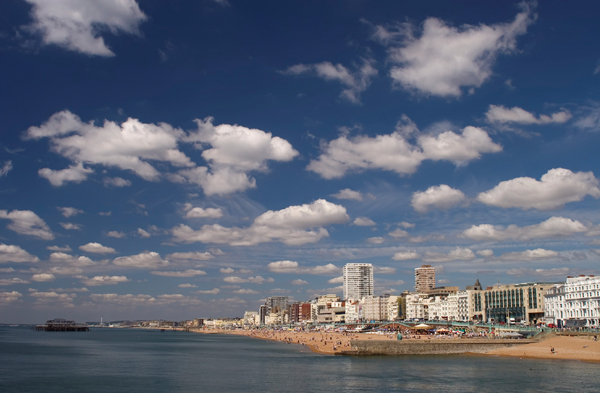Brighton businesses seek to boost local economy
Brighton and Hove has weathered the recession relatively well. Officials and politicians are now looking for economic growth. Frank le Duc reports

Officials, politicians and businesses in Brighton and Hove have been working together to try to find ways to boost the local economy. The fruits of their labour have been gathered together in a document called the Brighton and Hove Economic Strategy. At the time of writing, Brighton and Hove City Council was expected to give its formal backing to the strategy. A decision was due to be made last Thursday (24 October).
The strategy recognises a number of “opportunities and challenges” as well as spelling out some of the assets that have enabled Brighton and Hove to thrive reasonably well during the downturn. One factor was relatively cheap labour. For many years jobs in the area have been poorly paid. Those looking for higher wages have tended to end up commuting to Crawley, Gatwick and London.
So among the aims of the new strategy is a desire to create not just jobs but better-paid jobs. These would, it is hoped, encourage more people from the area to work in the area, contributing to a greener economy. The way to achieve this is by supporting significant growth industries such as the digital sector and the new environmental industries.
GREATER AMBITION
A Brighton and Hove City Council report on the economic strategy said: “Brighton and Hove has emerged strongly from being a low-value coastal economy but it has yet to make the transition into a high-performing one. It needs to champion greater ambition, provide a better mix of quality business accommodation and embed its universities into the fabric of its economy so that it can develop and retain the right talent and commercialise its expertise. Its strengths lie largely in its creativity and how it can apply this effectively to support economic growth.”
The strategy says: “The sectors that most stakeholders consider to be important to the city’s economy are culture, leisure and tourism, and creative, digital and IT (CDIT)”. The report to councillors said: “The CDIT sector is now recognised in government circles as important to the city’s economy’s future. It has seen double-digit employment growth in recent years, is strongly export-oriented and the clustering that has occurred in the city is proving to be self-sustaining.
“The sector is on the cusp of becoming mature. However, its businesses need access to better premises and technical skills and models of innovation support that focus on strengthening knowledge exchange networks and collaboration.”
SUSTAINABLE BUILDING
“The economic strategy suggests that there is also some potential within the environmental industries. It cites some evidence of renewable energy clustering around Shoreham Port and suggests that expertise within the universities could be better harnessed to support growth in the eco-tech sector. However, it warns that there is not the potential to develop a presence across all the environmental industries and that sustainable building, through a retrofit programme, may be the best focus for the city.
“The creative, digital and IT sector is now recognised in government circles as important to the city’s economy’s future”
“The route to a greener economy may be through better engagement with our neighbours, supporting the development of a renewable energy cluster in Shoreham and the development of a clean-tech cluster in Newhaven, from where E.on will service its offshore wind farm. Newhaven is also home to a new energy management centre and there are plans for an environmental and marine engineering university technical college.
“The strategy also recommends encouraging mainstream businesses to change the way they operate. This could include incorporating energy security, resource efficiency and affordability into jobs and new investments; encouraging businesses to develop local low-carbon supply chains; creating more local jobs and use technological innovation to reduce the need to travel and developing ‘smart city’ management systems to improve the quality and affordability of public services and to reduce transport congestion and pollution.”
IT’S THE ECONOMY, STUPID
The strategy calls to mind the campaign slogan that helped Bill Clinton win the American presidency: “It’s the economy, stupid.” It also looks at ways to attract funding from the European Union and the local enterprise partnership Coast to Capital. Other strategies produced by the council have already identified other sources of funding for local projects – and the jobs that they support – such as the Homes and Communities Agency.
But while building new homes and refitting old homes so that they are greener will support some jobs, it’s the growing number of high-tech businesses that seems to offer the most hope. And it’s not just the economic strategy that has focused on the value of these businesses of the future. The results of a two-year research project known as the Brighton Fuse have just been published.
DIGITAL BUSINESS
The research found that the creative, digital and IT sector (CDIT) employs about 9,000 people – or 6.5 per cent – of the local workforce. And that digital businesses contribute more than £700 million to the local economy. Estimates for the tourism and hospitality sector suggest that it’s worth between £750 million and £1 billion. So the new kids on the block have come a long way in a short time.
Tony Mernagh, executive director of the Brighton and Hove Economic Partnership, said: “One of the most impressive facts to come out of the study is the rate of growth of digital companies. The sector is growing at over twice the national rate for digital businesses and four times the rate for other non-digital sectors and ten times the UK rate for non-digital.
“Barriers to further growth were identified, however, including the cost and shortage of good quality office stock. One respondent in the study said that their offices in central Manhattan were cheaper that Brighton. Another surprising finding was the number of founders of digital businesses that didn’t have degrees related to the sector. Indeed vast numbers had managed to wed humanities degrees with ideas for digital businesses.”
The Brighton Fused report – focused on the success locally of businesses in which arts and sciences are fused to create a dynamic enterprise – said: “The links between Brighton’s technology cluster and the Universities of Brighton and Sussex are important, and growing. Graduates might choose to stay on in the area to join a business or even to found one.
“The findings emphasise the importance of the arts and humanities to a sector that has often seen them as ‘soft’ subjects. By integrating these creative arts with science, technology, engineering and mathematic (STEM) skills, businesses are pursuing a powerful growth agenda. However, integrating disciplines is not easy. In many ways, fused and superfused companies have become successful against the odds. Our educational systems favour specialisation, separating arts and science students as if they were volatile chemicals.”
Much has been said and written about the local economy by policymakers, politicians and academics. And some of them are working quietly behind the scenes to attract the inward investment that will support jobs and growth in the coming years. Research and the economic strategy can provide some ideas about where we go and how we get there. But progress depends on those working in CDIT businesses, the ambitious cultural sector and the eco-tech industry to turn a profit and take on more people. Our future is in their hands.




















